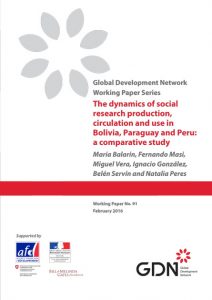The dynamics of social research production, circulation and use in Bolivia, Paraguay and Peru: a comparative study
| Year | : | 2016 |
|---|---|---|
| Author/s | : | Maria Balarin, Fernando Masi, Miguel Vera, Ignacio González, Belén Servín, Natalia Péres |
| Area/s | : | Education and learning |
Balarín, M., Masi, F., Vera, M., González, I., Servín, B. y Peres, N. (2016). The dynamics of social research production, circulation and use in Bolivia, Paraguay and Peru: a comparative study. Working Paper, 91. Washington, DC: GDN.
The paper presents the results of a comparative study of the social research production environments of three Latin-American, low- and middle-income countries: Bolivia, Paraguay and Perú. It draws from three case studies – one of each country – based on in-depth interviews with key informants (policymakers, researchers, leaders of higher education and research institutions) conducted under a common thematic protocol. The comparative examination of the three case studies shows important commonalities such as the weak or null presence of the state in social research policy and funding. All three countries are also marked by a common instrumentalist approach to social research production, albeit of a technocratic kind in Peru and Paraguay, while in Bolivia it is of a political/populist nature. Together, these factors have a strong impact on the low research outputs of these countries as compared to other countries in the region, as well as on the types and quality of the research produced and on the circulation of research in academic journals. While there are important differences too, for instance in the degree of institutional development and the profesionalization of research work – where Perú stands out as the more developed of the three countries – the bottom line is that research is still experienced as a solitary pursuit which suffers from the lack of research communities and critical mass.







